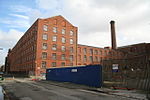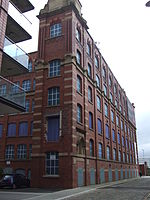Great Ancoats Street
Greater Manchester stubsStreets in ManchesterUnited Kingdom road stubsUse British English from May 2017

Great Ancoats Street is a street in the inner suburb of Ancoats, Manchester, England. It forms one of the stretches of the city's inner ring road.A number of cotton mills built in the early and mid-Victorian period are nearby, some of which have been converted into residential or office buildings, such as Albion Mill. The Daily Express Building is on Great Ancoats Street, as is the former Central Retail Park and various hotels. Great Ancoats Street forms the western boundary of the regenerated New Islington area of Manchester on the side of the Rochdale Canal.
Excerpt from the Wikipedia article Great Ancoats Street (License: CC BY-SA 3.0, Authors, Images).Great Ancoats Street
Great Ancoats Street, Manchester Miles Platting
Geographical coordinates (GPS) Address Nearby Places Show on map
Geographical coordinates (GPS)
| Latitude | Longitude |
|---|---|
| N 53.480833333333 ° | E -2.225 ° |
Address
Great Ancoats Street
M4 6DE Manchester, Miles Platting
England, United Kingdom
Open on Google Maps









